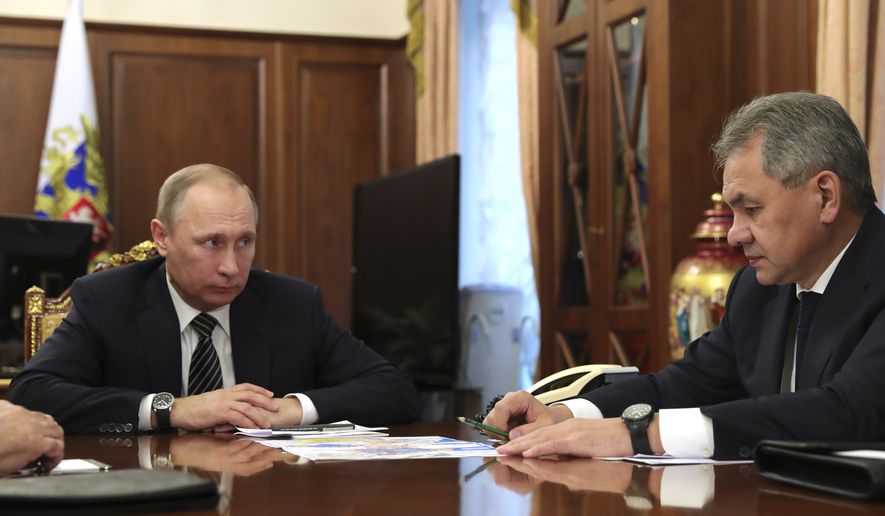OPINION:
Ukraine aside, one of the most coveted areas of the former Soviet Union is the tiny but strategically located country of Georgia, on the doorstep to the Caucasus. And a tug-of-war between Brussels and Moscow in recent days shows the size of the stakes involved.
In 2008, Russia and Georgia fought a brief war over the separatist regions of South Ossetia and Abkhazia, which Russian troops control to this day. It’s obvious Russia still covets Georgia. Several times in the recent past Russian troops have secretly moved border markers in the middle of the night to shift nearby infrastructure to the control of the breakaway regions.
As of now, Moscow effectively controls approximately 20 percent of Georgia’s sovereign territory. Enter, stage left, the European Union, which poked the Russian bear earlier this month by offering to enter into discussions to give Georgians visa-free travel to the 27-nation bloc. This would allow ordinary Georgian citizens to travel without restriction throughout Europe, a very big prize indeed.
It would be a reward for good behavior: Georgia has been one of the most effective of the former Soviet Republics in fighting corruption and curbing state power over the lives of its citizens. (I’m told you can get a passport in Georgia in 15 minutes; tell that to our State Department.) Georgia is far less corrupt than Ukraine, for instance, where the struggle for the last two decades against oligarch control has made minimal progress.
Being the only majority-Christian country in the Caucasus is also a big factor, for Russia and the West. Strategically, Georgia is smack dab in the middle of Islamic State country, with Turkey to the west and Chechnya to the north. Armenia is nearby, armed to the gills with Russian weapons. Yes, Georgia is very important to Russia. And don’t forget — Stalin was born in Georgia.
So the fact that the EU is offering to allow Georgians relatively open access is quite a big deal. Perhaps this is why the Russian Foreign Ministry just this week offered to “discuss” a similar arrangement for Georgians to travel to Russia without needing a visa.
“As for the Russian side, President Vladimir Putin has quite clearly stated that the possibility of introducing a visa-free regime with Georgia on a reciprocal basis is not excluded. We remain open to collaboration with the Georgian authorities,” Russian Media Agency spokesman Grigory Karasin told RIA Novosti.
He noted that the EU visa-free offer would require Georgia to pass major new legislation, while the number of visas issues by Russia’s Tbilisi office had almost doubled this year.
“I have no doubts that positive tendencies will be boosted in 2017,” Mr. Karasin said.
There is the little problem that Georgia, after the 2008 conflict, made it illegal for Georgian citizens to cross from Russia into the South Ossetia or Abkhazia enclaves. Most of the world still recognizes these two regions as Georgian territory. The Kremlin is simply saying that this legislative roadblock has to be removed before the Kremlin can discuss a visa-free regime with Tbilisi.
Moscow has made no secret of its long-term ambition to pull former Soviet republics or satellites back into its sphere of influence. From the Baltics to the Balkans, the Kremlin has made great progress. And the Western campaign to isolate Moscow for its aggressiveness is weakening. Nationalist movements in France and Germany are campaigning to remove the sanctions against Russia, imposed after its annexation of Crimea and the simmering conflict in Donbass.
The problem is Georgia is not cooperating and the EU stands to make things worse in Moscow’s view by dangling the prize of visa-free travel. Perhaps Moscow will make further inroads into the Georgian government and eventually get the legislation changed so normal diplomatic relations could be established.
It seems the incoming Trump administration will have a great impact on this situation depending on which side it favors. Only time will tell for Georgia.
• L. Todd Wood is a former special operations helicopter pilot and Wall Street debt trader, and has contributed to Fox Business, The Moscow Times, National Review, the New York Post and many other publications. He can be reached through his website, LToddWood.com.




Please read our comment policy before commenting.